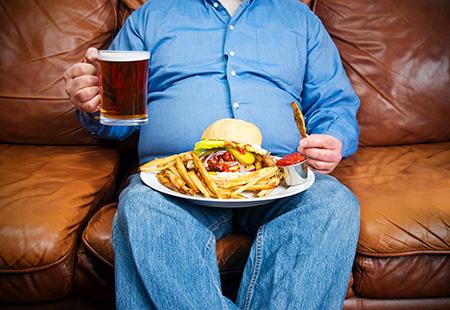
Intermittent Fasting, Balanced or a Keto Diet? Food for Thought
We all know that exercise and a good diet are important for a healthy body. But how much exercise, and what is a good diet?
In a two-part series, we learn from UC Davis molecular exercise physiologist Keith Baar how our bodies respond to physical activity and in what ways different diets affect our metabolism. Baar is a professor in the Departments of Neurobiology, Physiology and Behavior and of Physiology and Membrane Biology. We will start with how balanced, intermittent fasting and keto diets affect our bodies.
What’s more important for weight loss and good health: diet or exercise?
Our bodies will behave differently based on the combination of physical activity and nutrition. It is no secret that it takes a lot of exercise to change our body weight. But nutrition allows us to regulate our body weight better than exercise.
I always tell people that if you run a mile that's 100 calories. If you then eat a piece of white bread or about 10 tortilla chips, that's 100 calories. So, it is easier to regulate your weight with your nutrition, but adding more physical activity will help you better regulate your health.
In what ways do our current lifestyle and food choices impact our bodies?

Your body is designed to go through periods of feast and famine. It was programmed through evolution for ups and downs in food and other stresses, like disease or the need to flee.
What has happened over the last 20,000 years, is we've gotten more efficient – we produce more food with less work. This has led to what we call hypokinetic diseases, health problems resulting from moving too little. We have also shifted our diet to more frequent eating and more processed foods that are rich in carbohydrates. The result is more stimuli that are not ideal for keeping our muscles and the rest of our body healthy.
Why do they say good food is good medicine?
Our muscles and immune system use very similar signals. They both want to turn on a protein, known as the mechanistic target of rapamycin (mTOR), when they need to respond to a stimulus, store calories, grow, or fight an antigen. With our classic over-consumption of processed foods, we get into a chronic level of high mTOR protein activation, and this leads to things like insulin resistance and chronic inflammation.
Then, when your body needs to respond quickly – like when exposed to a high carbohydrate meal or a virus – it is slow to respond because the signal is drowned out in the noise.
This is why a lot of diets that improve lifespan or health – such as low protein and low carbohydrate diets or time-restrictive feeding – target mTOR activity. On these diets, the activity of mTOR is much lower at rest. This is important, for example, in case our body needs to respond to a virus. It has a much greater dynamic range and can rapidly turn on the processes it needs to respond to the threat. When we bring the baseline mTOR activity down, we can also improve how the body generates energy by removing faulty mitochondria (the power engines in the cells), allowing our muscles and brains to work better.
Is a balanced diet ideal for the body?

A balanced diet that includes a variety of carbohydrates, proteins and fat can be great for the body if we allow for periods where calories are low. One option is eating around 10% below your caloric need. Another option is to limit when you eat, having periods of around 17 hours a day when you don’t eat. Both these strategies bring that baseline down, but they can be really hard for many people.
What about the benefits of the ketone (keto) diet?
A keto diet is about eating more fat and protein-rich foods and fewer carbohydrates. The aim is to reach a state of ketosis as your body burns fat for fuel, instead of sugar. This process leads to the production of acids known as ketones.
In our studies on keto diets in mice, we compared a low-carbohydrate group to a ketogenic diet group. The benefits we saw in muscle as far as mitochondria, strength and endurance; in the brain as far as learning in memory; and in lifespan, were all better on the ketogenic diet than on a low carb diet. There is something about those ketones (beta hydroxybutyrate) which is really good for our longevity, muscles and brain. But the keto diet has its own set of risks, including weaker bones and the possibility for increased cholesterol in some people.
It is easier to regulate your weight with your nutrition, but adding more physical activity will help you better regulate your health.”—Keith Baar, UC Davis molecular exercise physiologist
Is intermittent fasting good for the health?
We would think of intermittent fasting more as time restricted feeding. You have periods of fasting then periods of eating.
The work of UCSD Professor Satchin Panda with different individuals and groups clearly shows that time-restricted feeding can really have a beneficial effect. During the fasting part, your body resets the baseline of many things, including mTOR activity.
One of the things that also happens towards the end of a fast is that the body produces ketones, similar to a keto diet. Yet, eating a normal diet but restricting when you eat will not give you all the benefits of the keto diet. When the body is put in periods of longer fasts, it will start producing ketones, but may not get to the levels that you need for therapeutic ketosis.
How do you see the future of dieting?
For our health and longevity, it would be great if we are able to go on a mixed diet, eating all the different things we want, while still getting the cognitive and muscular benefits of a keto diet. One important question is: is it possible to eat a normal diet and get ketones from supplements, like keto esters or keto salt drinks? In other words, can we get the benefits of the keto diet without its problems, like weaker bones and potentially higher cholesterol? Unfortunately, such a diet would not cause weight loss and whether it would improve muscle and brain function is something we don't know yet.
Note: People with special dietary needs or a medical condition should ask their doctor or a registered dietitian for advice.
Media Resources
- Nadine A Yehya, nyehya@ucdavis.edu, 916-734-9036
- This article was originally published for National Nutrition Month (March)
